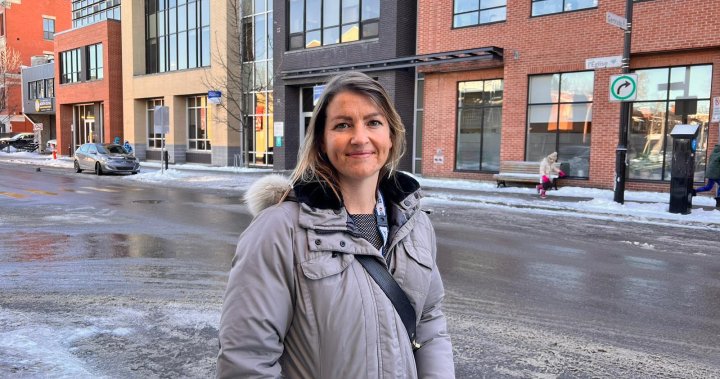Family physician Dr. Eveline Gaillardetz worked all day, but didn’t set foot in a clinic or hospital on Friday. She worked in her car and at the homes of her patients in Verdun.
“I think now the new generation of doctors, they see how home care can save the health-care system,” Gaillardetz told Global News as she drove to a private seniors home where she has multiple patients.
Gaillardetz is part of a team of 15 doctors and nurses at the Verdun CLSC known as SIAD (Soins intensifs à domicile).
They visit palliative care patients approaching the end of life so they won’t have to go to an overcrowded ER. There’s a doctor on call 24/7.
“It’s a very demanding practice, but it’s a beautiful practice too,” the physician said.
She received calls repeatedly in the two hours Global News spent with her on Friday.
“Without even having to send him to the emergency, we could provide the care that this patient needs at home,” she said after getting off one call.
Health authorities said this week that many seniors are showing up to emergency departments these days. It’s a problem that is likely to get worse in the years to come.
“We know that we’re at the beginning of that new trend of having a very old population,” said Gaillardetz.
Get the latest Health IQ news.
Sent to your email, every week.
Quebec’s Golden Age Federation (FADOQ) wants to see SIAD, and home care in general, expanded.
“The state of palliative home care in Quebec is really deplorable,” said FADOQ government relations director Philippe Poirier-Monette. “Nearly 80 per cent of the Quebec population dies at hospital. In the UK, it’s about 50 per cent and in the Netherlands it’s 30 per cent.”
The Verdun Hospital ER even calls SIAD when certain geriatric ER patients meet the profile.
“We’re able to bring the patient back home earlier by doing that,” said Gaillardetz.
Though CLSCs offer varying levels of home care across Quebec, SIAD’s 24/7 on call doctor model remains rare. Quebec’s health ministry told Global News there are now 33 SIAD units across the province, but Gaillardetz said they aren’t all equipped with full medical teams like the one in Verdun is. A 2022 government report obtained by Global News showed SIAD is only in one of Montreal’s regional health authorities.
“I think now we’re a bit late because now we’re facing a crisis,” said Gaillardetz.
SIAD’s founder Dr. Geneviève Dechêne claimed last week the government is stunting the program’s growth.
“It’s a job that young doctors love to do, but they’re blocked,” she said in an interview.
Dechêne says Quebec’s General Practitioners Federation (FMOQ) prefers doctors to be in higher paying hospital jobs over home care jobs.
“The physician remuneration is modulated in such a way that they don’t have incentive to perform home medicine,” said Poirier-Monette.
“We know the solution, but there are some blockers,” said Dubé. “I think the blockers sometimes can be a matter of the fees. Is there a preference for fees being at the hospital and instead of at home?”
Dubé said if the rates can be changed, the government will work to make that solution a reality quickly.
“It’s a priority for the FMOQ, we don’t know if it’s a priority for the government, but we are working with the government to try to pay more to home care doctors,” said FMOQ president Marc-André Amyot.
Gaillardetz also works part time in the ER of the Verdun Hospital.
“If I would only work in the emergency, I would probably be richer than doing home care. But doctors don’t do medicine for money,” she said.
Gaillardetz just hopes more resources are sent toward palliative home care soon, so as many seniors as possible can be treated in familiar comfort rather than going to a busy ER.
© 2024 Global News, a division of Corus Entertainment Inc.




